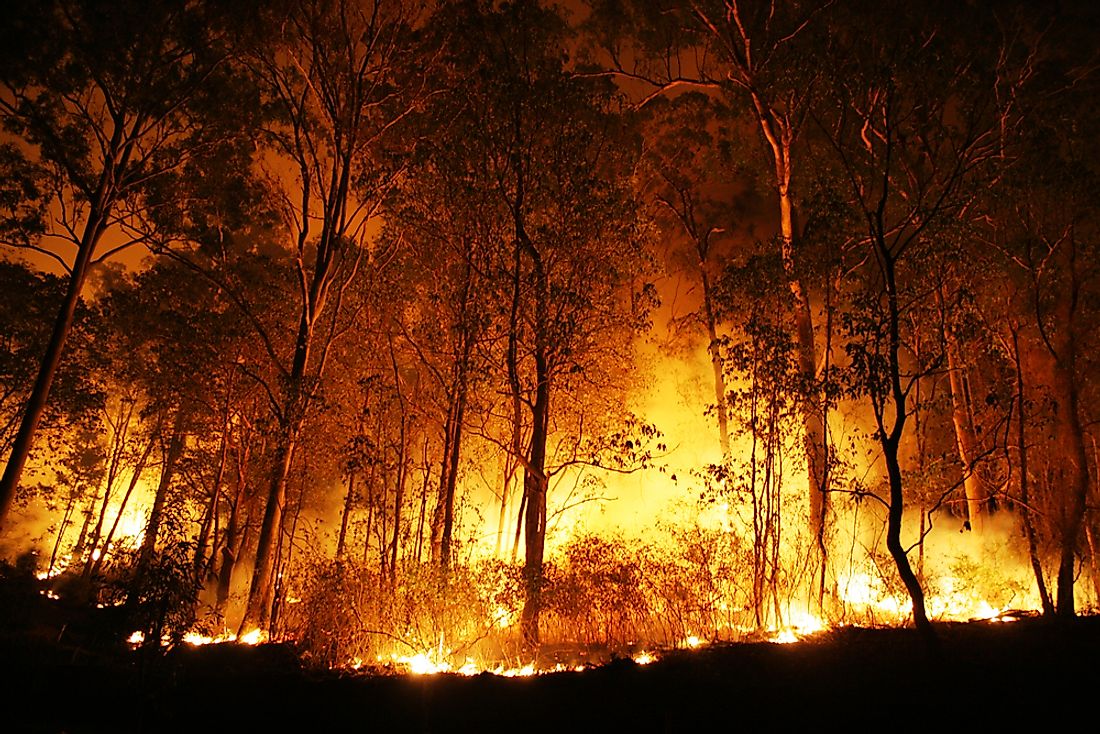What Causes Forest Fires?

One of the most prevalent causes of global deforestation and destruction of wildlife is fire. In the United States in particular, fire has ravaged many areas of both forest and countryside. Forest or wildlife fires spread at different speeds depending on vegetation, weather conditions, and physical features. Discovered fossil charcoal indicate that forest fires are not new to modern history as some date back to over one hundred million years ago. The Earth is said to be a fundamentally flammable planet because of the existence of vegetation rich in carbon, dry climates, oxygen in the atmosphere, lightning, and volcanic activities among others.
Human Causes
Human activities near or within forested areas are the number one cause of forest fires. Smoking near vegetation can cause a widespread fire when a smoker throws a cigarette into vegetation without completely extinguishing its burning butt. While most smokers throw lit cigarettes innocently, their actions have caused several forest fires throughout history. Some fires may take a few hours before being noticed as the fire starts small and spreads slowly at first before gaining momentum. Equipment such as machinery used in logging and hunting can also cause fires. Bullets hitting on some dry vegetation may result in fires. Petroleum products used in logging equipment can cause fires when there is a leak onto the vegetation. Other causes include campfires that are not well monitored or put off entirely. Electric faults from facilities or electricity plants near forests can also cause fires. In some extreme cases, people have deliberately caused fires during hunting to corner wild animals while others burn forests to clear the way for agriculture or development activities. Lastly, some people just start fires without any reason (arson). Up to 90% of forest fires in the US are caused by humans.
Natural Causes
Lightning is the biggest natural cause of forest fires. The different lightning strokes of varied electric voltages cause fire through directly igniting vegetation with high currents. Lightning fires are always more common immediately after dry seasons when vegetation is still dry. Lightning fires destroy more vegetation than human-caused fires. This is because lighting fires occur in remote areas far from human presence and are not notice in time, unlike fires caused by human activities. Lightning caused fires also occur in rough terrains and dangerous places which makes it hard for fire suppression equipment and personnel to reach the fire on time. In rare occurrences, volcanic activities such as eruptions and lava flow can cause fires which are difficult to put out because of the lava flow and other associated risks. In most cases, firefighters try to create a buffer zone where they can manage the fires. Spontaneous combustion of dry leaves and vegetation may also be responsible for some fire outbreaks.
Prevention
Most natural fires are usually monitored and allowed to burn, with the aim of balancing a forest's ecology. Vegetation may also be burned occasionally in order to balance species. Authorities have undertaken awareness campaigns on the causes of fires to reduce human initiated fire incidences. In some cases, firefighters burn sections of forest vegetation to control possible fires in the future by creating buffer zones. Wildfire suppression can be done in various ways. Simple techniques such as throwing layers of soil can be used. In some cases, unmanned aerial planes can be used to drop water and fire retardants.











